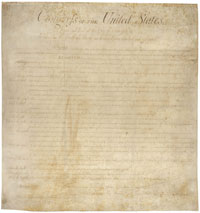In modern America’s contentious political climate, we often hear about “activist judges” writing laws from the bench. The Supreme Court, consisting of nine judges who are appointed by the President and Congress for life, may seem far removed from the populist democracy created by the founders, and while voters appear to have very little say in how the Supreme Court decides cases, David Cole’s book Engines of Liberty: the Power of Citizen Activists to Make Constitutional Law shows that community members have great influence over Constitutional law, even before an stately body such as the Supreme Court. Cole will make that case in a talk at the City Club of Cleveland on December 7, 2016 at noon.
The Constitution of the United States is the supreme law of the land. If a national, state or local law, or an action by a government official contradicts it, the Constitution prevails. And it is very hard to change the Constitution, requiring approval by three quarters of the states. The people that interpret what it means and whether laws violate it are the Supreme Court, a nine-judge panel chosen for life by the President and confirmed by the Senate. They decide what is “constitutional” or “unconstitutional” and those decisions can’t be changed by Congress or the President.
Since its founding in 1920, the ACLU has worked to defend and protect Americans’ constitutional rights across the nation, primarily through landmark lawsuits, whether the cause was popular or unpopular. In 1896, the Supreme Court had decided that “separate but equal” facilities for Black Americans did not violate the section of the 14th Amendment to the Constitution that forbid the government from denying “to any person… equal protection of the laws.” Fifty years later, the ACLU supported the case of Brown v. Board of Education of Topeka, which declared that separate school facilities were inherently unequal, and ordered racial desegregation at public schools across the country.
While litigation has helped to set massive constitutional precedents, it is rarely the first or best means of changing public opinion or protecting marginalized groups. While Brown v. Board of Education is often seen as the beginning of the contemporary civil rights movement, it was truly the culmination of decades of work by passionate activists. One of those activists was A. Philip Randolph, whose leadership in labor strikes for Black railroad porters and marches for the integration of federal workplaces and the US armed forces set the stage for desegregation of public schools.
Similarly, the case of Obergefell v. Hodges, which outlawed discrimination against gay couples who sought to marry, may have been brought by the ACLU, but it took a century of work by activists, ranging from liberal firebrands like Larry Kramer to conservative intellectuals like Andrew Sullivan, to push the issue to the forefront of the public consciousness.
Citizens passionate about creating change and peacefully pursuing freedom for all Americans regardless of sex, gender identity, sexual orientation, disability, ethnicity, class or race who pursue direct action on issues will often find their work has forced the Supreme Court to consider an issue and make the right decision. To do this, they get down in the trenches fighting, leading and crawling until they reach their goal, whether it be months or years in the making.
If direct action appeals to you, get involved by participating in the City Club’s community forum with David Cole, where he will outline how community members can influence constitutional law. Cole will succeed Steven R. Shapiro, stepping down after 23 years, as National Legal Director for the ACLU, where he will directly manage 100 ACLU staff attorneys in the organization’s New York headquarters, and provide leadership to more than 200 staff attorneys who work in ACLU affiliate offices in all 50 states, Puerto Rico, and Washington, D.C.
For more information about this talk, please visit cityclub.org.

